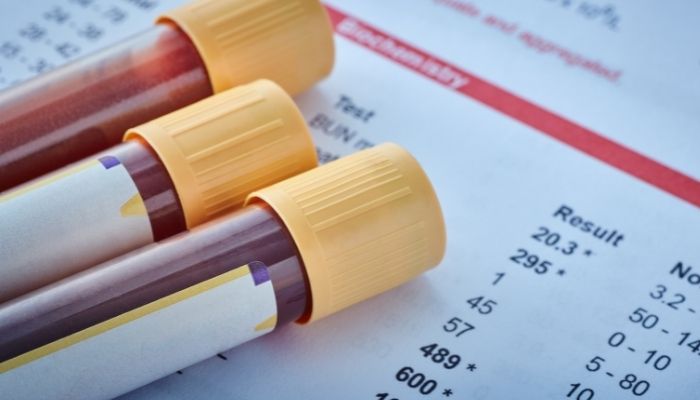The Flow Cytometry test is a specialized technique for the detection and analysis of chemical and physical attributes of particles and cells via lasers. It is used commonly for the evaluation of peripheral blood, other body fluids and the bone marrow. The Flow Cytometry blood test cost is usually around Rs. 1,000-2,500 depending on the test type, location, and other factors.

Throughout the entire procedure, a sample of either particles or cells will be suspended within fluid before injection into the flow cytometer machine. Roughly 10,000 cells may be processed and analyzed by a computer within one minute or even less.
Test Summary of Flow Cytometry Test
| Name of the Test | Flow Cytometry |
| Purpose | Cell Counting, Sorting, Function Determination, Characteristics’ Determination, Microorganism Detection, Biomarker Detection, Treatment and Diagnosis of Bone Marrow and Blood Cancers |
| Why is it needed | For characterization and counting of white blood cell types while analyzing infectious ailments, immuno-deficiencies and auto-immune disorders |
| Types | Multicolor Flow Cytometry and Flow Cytometry Gating |
| Cost | Rs. 1,000-2,500 |
What Is the Use of a Flow Cytometry Test?
The Flow Cytometry test is used for researching various objectives including the sorting and counting of cells, determination of cell characteristics and functions and also the detection of micro-organisms like fungus, bacteria or yeast. It is also used for discovering biomarkers and the diagnosis and possible treatment of bone marrow and blood cancer.When Is the Flow Cytometry Test Required?
The test is absolutely necessary when there is need for identification, characterization and counting the types of WBCs (white blood cells) while analyzing infectious ailments, immuno-deficiencies and auto-immune ailments. It is also useful in the diagnosis and classification of lymphoma or leukemia. Flow Cytometry is usually done as a follow-up testing procedure post the CBC/WBC (complete blood count or white blood cell) scan. This is truer in case the initial testing procedure demonstrated a higher lymphocyte count or abnormal counts of cells or even immature blood cells being present.Doctors usually make use of Flow Cytometry for the prediction of the cancer type in question, how serious it is going to be and also for working out whether it may respond to specific treatment types. It may also help in knowing whether the disease has returned after previous treatment. Flow Cytometry may be necessary whenever the doctor requires information about body cells. The test may also help in checking immune cell counts, cell cycles and their statuses, DNA analysis and so on.
Who Does a Flow Cytometry Test?
Flow Cytometry is done by a pathologist or lab technician. The test requires a bone marrow, blood, tissue or body fluid sample.What Is the Flow Cytometry Test Procedure?
The sample will be put into the suspension before its injection into the specialized flow cytometer equipment. The cells will be arranged as required before being put before the laser beam, and fluorescent, and scattered light. They will thereafter be categorized and counted accordingly. Data will remain stored on the computer before reporting via the dot plot or histogram.Types of Flow Cytometry Test Procedures
The multicolor Flow Cytometry procedure has various cell types being tested simultaneously, i.e., tissue or blood cells together for instance. Fluorescent dye is used for marking particular types of cells. The machine will sort the cells by their color and their type.There is another procedure known as Flow Cytometry Gating. This is a key principle which indicates the procedure of refining and identifying any particular population of cells. This is accomplished through the selection of any particular zone on the chart generated by the computer. It helps in informing the machine about the cells to be analyzed and the ones which are not required for analysis anymore.
Preparation & Risk Factors for Flow Cytometry Test
Unless there are any recommendations from the doctor, people do not usually require any specific type of preparation before taking this test. They only have to go to their doctor’s office for depositing the sample.After the test, the results will be analyzed by the doctor before interpreting them to the patient. There are no risks known for these testing procedures as of yet.
Understanding the Test Results
The pathologist or doctor will analyze and decode the results of the test. The findings will be given in the lab report as well. The analysis results will be taken in conjunction with the patient’s symptoms, medical history and physical testing results.The doctor will check the antigens or markers on the cells. Healthy cells will always have antigen patterns syncing with the maturity or type of the cell in question. Abnormal cells will demonstrate varying patterns, indicating diseases such as lymphoma or leukemia. The results may be abnormal in case of Non-Hodgkin Lymphomas, multiple myelomas, acute lymphoblastic leukemia, acute myeloid leukemia, and chronic lymphocytic leukemia.


